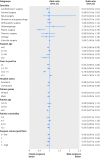Comparison of postoperative outcomes among patients treated by male and female surgeons: a population based matched cohort study
- PMID: 29018008
- PMCID: PMC6284261
- DOI: 10.1136/bmj.j4366
Comparison of postoperative outcomes among patients treated by male and female surgeons: a population based matched cohort study
Abstract
Objective To examine the effect of surgeon sex on postoperative outcomes of patients undergoing common surgical procedures.Design Population based, retrospective, matched cohort study from 2007 to 2015.Setting Population based cohort of all patients treated in Ontario, Canada.Participants Patients undergoing one of 25 surgical procedures performed by a female surgeon were matched by patient age, patient sex, comorbidity, surgeon volume, surgeon age, and hospital to patients undergoing the same operation by a male surgeon.Interventions Sex of treating surgeon.Main outcome measure The primary outcome was a composite of death, readmission, and complications. We compared outcomes between groups using generalised estimating equations.Results 104 630 patients were treated by 3314 surgeons, 774 female and 2540 male. Before matching, patients treated by female doctors were more likely to be female and younger but had similar comorbidity, income, rurality, and year of surgery. After matching, the groups were comparable. Fewer patients treated by female surgeons died, were readmitted to hospital, or had complications within 30 days (5810 of 52 315, 11.1%, 95% confidence interval 10.9% to 11.4%) than those treated by male surgeons (6046 of 52 315, 11.6%, 11.3% to 11.8%; adjusted odds ratio 0.96, 0.92 to 0.99, P=0.02). Patients treated by female surgeons were less likely to die within 30 days (adjusted odds ratio 0.88; 0.79 to 0.99, P=0.04), but there was no significant difference in readmissions or complications. Stratified analyses by patient, physician, and hospital characteristics did not significant modify the effect of surgeon sex on outcome. A retrospective analysis showed no difference in outcomes by surgeon sex in patients who had emergency surgery, where patients do not usually choose their surgeon.Conclusions After accounting for patient, surgeon, and hospital characteristics, patients treated by female surgeons had a small but statistically significant decrease in 30 day mortality and similar surgical outcomes (length of stay, complications, and readmission), compared with those treated by male surgeons. These findings support the need for further examination of the surgical outcomes and mechanisms related to physicians and the underlying processes and patterns of care to improve mortality, complications, and readmissions for all patients.
Published by the BMJ Publishing Group Limited. For permission to use (where not already granted under a licence) please go to http://group.bmj.com/group/rights-licensing/permissions.
Conflict of interest statement
Competing interests: All authors have completed the ICMJE uniform disclosure form at www.icmje.org/coi_disclosure.pdf and declare: no support from any organisation for the submitted work; no financial relationships with any organisations that might have an interest in the submitted work in the previous three years; no other relationships or activities that could appear to have influenced the submitted work.
Figures
Comment in
-
Improving patient outcomes after surgery.BMJ. 2017 Oct 10;359:j4580. doi: 10.1136/bmj.j4580. BMJ. 2017. PMID: 29018003 No abstract available.
References
-
- Thomas WE. Teaching and assessing surgical competence. Ann R Coll Surg Engl 2006;88:429-32. 10.1308/003588406X116927 pmid:17002841. - DOI - PMC - PubMed
-
- Birkmeyer JD, Finks JF, O’Reilly A, et al. Michigan Bariatric Surgery Collaborative. Surgical skill and complication rates after bariatric surgery. N Engl J Med 2013;369:1434-42. 10.1056/NEJMsa1300625 pmid:24106936. - DOI - PubMed
-
- Frank E, Dresner Y, Shani M, Vinker S. The association between physicians’ and patients’ preventive health practices. CMAJ 2013;185:649-53. 10.1503/cmaj.121028 pmid:23569163. - DOI - PMC - PubMed
-
- Lurie N, Slater J, McGovern P, Ekstrum J, Quam L, Margolis K. Preventive care for women. Does the sex of the physician matter?N Engl J Med 1993;329:478-82. 10.1056/NEJM199308123290707 pmid:8332153. - DOI - PubMed
-
- Bertakis KD, Helms LJ, Callahan EJ, Azari R, Robbins JA. The influence of gender on physician practice style. Med Care 1995;33:407-16. 10.1097/00005650-199504000-00007 pmid:7731281. - DOI - PubMed
Publication types
MeSH terms
LinkOut - more resources
Full Text Sources
Other Literature Sources
Medical

